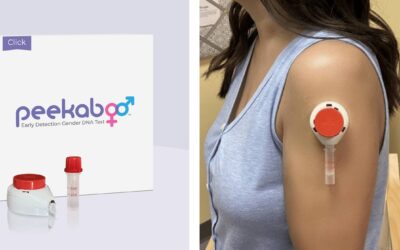
While a missed period is often the first clue that a woman is pregnant, some women experience symptoms sooner, including headaches, fatigue, and/or breast tenderness. Of course, these symptoms can also be signs of an imminent period, resulting in uncertainty and a range of emotions until a woman finds out for certain if she’s pregnant.
The hormone human chorionic gonadotropin (hCG) is detected in the urine or blood only when a woman is pregnant. Therefore, it is the basis of all pregnancy tests. The cells that surround the growing embryo and eventually form the placenta produce hCG, making it important in the early stages of pregnancy. Production of hCG begins after the fertilized egg is implanted in the uterus, and it builds up in the body during the first trimester. In addition, hCG ensures that the temporary endocrine gland (corpus luteum) produced after ovulation continues to produce progesterone during the first trimester of pregnancy.
Pregnancy Blood Tests
When you go to your doctor to confirm the result of a home pregnancy test (HPT), they’ll likely do a urine test and may order a blood test. The two types of blood tests to confirm pregnancy are:
- Qualitative tests, which provide a simple yes or no answer about whether a woman is pregnant
- Quantitative tests (also known as beta hCG tests), which determine levels of hCG in the blood and how far along a woman is in her pregnancy. Normal results of this test will show rapidly rising hCG levels during the first trimester. These levels peak around the sixth week and continue to decline and stabilize the remainder of the pregnancy
Frequently Asked Questions
How soon can a blood test detect pregnancy?
Blood tests are done in a doctor’s office and can detect hCG earlier in a pregnancy than urine tests. Typically, blood tests deliver results 6–8 days after ovulation with near 100% accuracy.
How is the test performed?
A pregnancy blood test is done the same way as other simple blood tests. A needle is inserted into a vein in the forearm and a sample of blood is drawn. The sample is sent to a lab to see if hCG is present, and the hormone levels are measured if the doctor orders a quantitative test.
Is a blood test more accurate than a urine test?
Although urine tests are highly accurate these days, blood tests are even more so.
How long does it take for blood test results?
The main disadvantage of blood tests is that the results take longer than urine tests. The actual blood test will likely take less than three minutes. Pregnancy results may come back in a few hours if the lab is in-house at the doctor’s office or a few days if it needs to be sent out.
Home Pregnancy Tests
It’s common these days for women to use HPTs before visiting their doctors. A plus sign or change in the color of the line indicates a positive result, while newer digital tests display the words “pregnant” or “not pregnant.” Because the amount of hCG in urine increases with time, it’s hard to detect hCG too early after a missed period. Some home tests claim they can detect pregnancy one day after a missed period or even earlier. However, a recent study shows most HPTs don’t yield accurate results that early. Here are a few helpful tips for using an HPT:
- Wait one week after your missed period for more accurate results
- Check the expiration date and follow all directions
- Test morning urine to possibly boost the accuracy
- Wait 10 minutes to get the most accurate result
The Efficacy of HPTs
According to a 2014 study, there were 60 HPT brands available in the U.S. alone. Here are other key findings of this study:
- Only two of the tested devices were highly rated in all categories by more than 50% of volunteers
- The device with the highest rating (90%) was digital, displaying the words “pregnant” or “not pregnant” in the window, rather than a colored line or symbol to indicate a positive result
- A device that received a high rating (60–70%) produced extremely high false-negative rates of 86–96%, which presents potential health concerns for mothers and unborn babies
Additional Early-Pregnancy Tests
Most pregnant women are given a blood test during their first prenatal visit to confirm pregnancy and check for a variety of other issues. According to the American College of Obstetricians and Gynecologists, it is standard practice for OBGYNs to order the following tests when blood is drawn.
Complete blood count (CBC): This common blood test counts the number of different types of cells that make up blood. The number of red blood cells can indicate the presence of a specific type of anemia, while the number of white blood cells can show how many disease-fighting cells are in the blood. And last, the number of platelets can reveal a potential problem with blood clotting.
Blood type and Rh factor: During the first trimester of pregnancy, a blood test is done to find out the expectant mother’s blood type. And blood is also tested to see if the expectant mom is Rh positive or negative. An estimated 15% of women have Rh incompatibility with their unborn baby. When a woman is Rh negative and her unborn baby is Rh positive, her body may produce antibodies against the Rh factor that damage the unborn baby’s red blood cells. While this typically doesn’t cause problems in a first pregnancy, it can in subsequent pregnancies. Women that are Rh negative may be given medication during pregnancy to help prevent the development of these potentially harmful antibodies.
Sexually- transmitted infections: Blood is checked for STDs such as syphilis, hepatitis B, and HIV.
Immunity to specific diseases: This includes rubella titers (a sign of immunity to German measles) and varicella (a sign of immunity to chickenpox).
Urinalysis: This test checks for the presence of urinary tract disease or urinary tract infection (UTI), as well as glucose levels. High blood sugar levels may be a sign of diabetes mellitus. This is a bigger concern if a woman is at an unhealthy weight, has developed gestational diabetes and/or had a large baby in a prior pregnancy, has a family history of diabetes, or has any other risk factors for gestational diabetes. After 20 weeks of pregnancy, the level of protein in the urine is checked. High levels of protein in the urine can be a sign of preeclampsia, a condition that can lead to serious and even fatal complications for the mother and baby.
Urine culture: This test looks for bacteria in urine, which may be a sign of a UTI. This test will be done both early and later in pregnancy.
Your Pregnancy is Confirmed. What Tests Are Next?
How exciting that you’re expecting a bundle of joy—congratulations! Thanks to advances in DNA testing, you no longer have to wait until an ultrasound to find out if you’re having a boy or girl. With the Peekaboo™ Early Detection Gender DNA Test, you can find out the sex of your baby as early as seven weeks into pregnancy in the convenience of your own home! Peekaboo is the only early-gender test endorsed by the American Pregnancy Association.







0 Comments